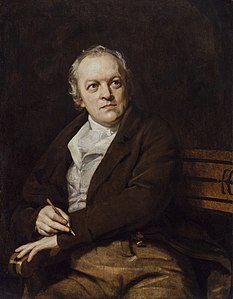Analysis of The Clod and the Pebble
William Blake 1757 (Soho) – 1827 (London)
'Love seeketh not itself to please,
Nor for itself hath any care,
But for another gives its ease,
And builds a heaven in hell's despair.'
So sung a little clod of clay,
Trodden with the cattle's feet;
But a pebble of the brook
Warbled out these meters meet:
'Love seeketh only Self to please,
To bind another to its delight,
Joys in another's loss of ease,
And builds a hell in heaven's despite.'
| Scheme | ABAB XCXC ADAD |
|---|---|
| Poetic Form | Quatrain |
| Metre | 1110111 11011101 11010111 010100101 11010111 101011 1010101 1011101 1110111 110101101 10010111 010101001 |
| Closest metre | Iambic tetrameter |
| Characters | 401 |
| Words | 77 |
| Sentences | 3 |
| Stanzas | 3 |
| Stanza Lengths | 4, 4, 4 |
| Lines Amount | 12 |
| Letters per line (avg) | 25 |
| Words per line (avg) | 6 |
| Letters per stanza (avg) | 102 |
| Words per stanza (avg) | 24 |
Font size:
Submitted on May 13, 2011
Modified on May 01, 2023
- 23 sec read
- 1,075 Views
Citation
Use the citation below to add this poem analysis to your bibliography:
Style:MLAChicagoAPA
"The Clod and the Pebble" Poetry.com. STANDS4 LLC, 2024. Web. 30 Apr. 2024. <https://www.poetry.com/poem-analysis/39165/the-clod-and-the-pebble>.


Discuss this William Blake poem analysis with the community:
Report Comment
We're doing our best to make sure our content is useful, accurate and safe.
If by any chance you spot an inappropriate comment while navigating through our website please use this form to let us know, and we'll take care of it shortly.
Attachment
You need to be logged in to favorite.
Log In